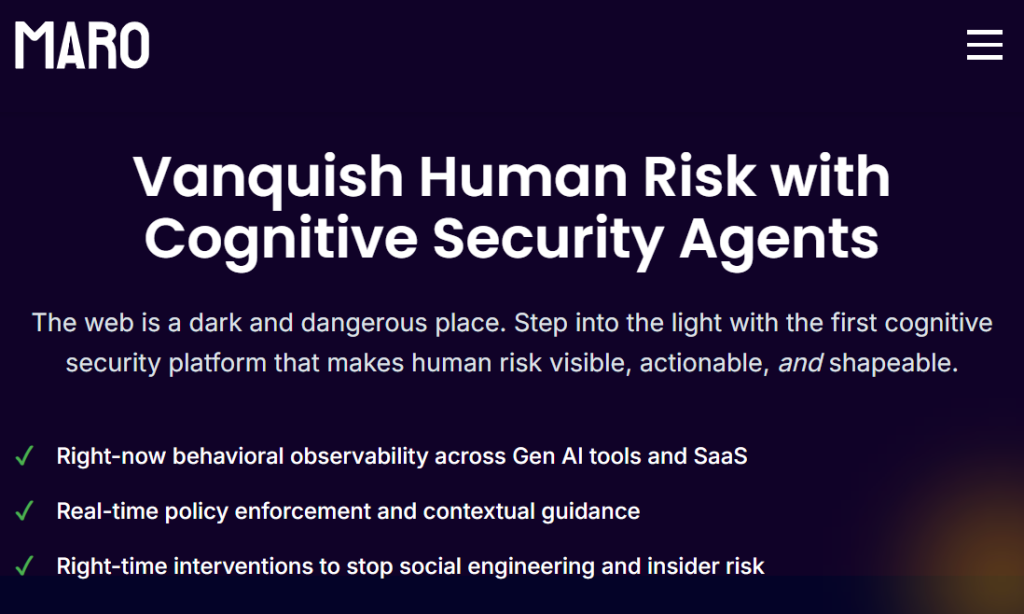Maro Raises $4.3M to Modernize Support Systems for Families and Caregivers
August 5, 2025
byFenoms Start-Ups

In a time when family mental health services are strained, siloed, and often inaccessible, Maro has emerged with a powerful response. The startup just announced its $4.3 million seed round, led by Downing Capital Group, as it sets out to rebuild the way families navigate pediatric mental health, emotional development, and neurodiversity support.
The co-founding team - Jadon Cruz Montero, Gwen Betts, and Jen A. - has fused backgrounds in healthcare, design, and engineering to craft a platform that doesn't just digitize care but makes it radically more human, accessible, and scalable.
A Human-Centered Layer for Care Navigation
Maro offers a holistic care navigation platform designed to support parents, caregivers, and educators with access to trusted mental health resources, developmental assessments, and tailored guidance. Unlike static content libraries or one-off therapy apps, Maro builds a dynamic support loop: combining personalized content, timely nudges, AI-driven assessments, and clinical pathways all in one place.
The core thesis? Support systems should scale as families grow - without losing the human touch. By weaving together behavioral science, UX design, and evidence-based care frameworks, Maro helps users:
- Detect early signs of emotional or cognitive distress in children
- Understand key developmental stages
- Get referrals to therapists, specialists, and support communities
- Access curated educational content tailored to unique family contexts
- Track progress and sentiment across time using AI-assisted journaling
Designing for the Emotional Load of Care
This is where Maro really shines. While many healthtech platforms fixate on diagnosis or outcomes, Maro focuses on the experience of caregiving itself - the often invisible emotional labor parents, teachers, and families shoulder daily.
To build with empathy, Maro employed participatory design: co-creating its features with real parents, educators, pediatricians, and neurodiverse families. One of their key insights: the biggest gap isn’t data or doctors - it’s emotional overwhelm.
That led the team to prioritize features like:
- Context-aware nudges: bite-sized guidance delivered at the right moment
- Journaling prompts and emotional tracking for caregivers themselves
- Peer stories that normalize seeking help
- Multi-channel access: web, mobile, and even print-friendly resources
And here’s a gem every founder can learn from: Maro builds for the decision moment. That inflection point where a parent wonders, “Is this normal?” is where Maro steps in - not to alarm, but to guide.
Designing products for emotional moments means calibrating tone, timing, and trust. If your product lives at the edge of vulnerability, your UX must act like a co-regulator, not a feature dump.
Unlocking Systemic Change with Embedded Care Infrastructure
Too often, care platforms operate in isolation - only surfacing in moments of crisis. Maro flips the script by embedding itself upstream in daily routines. Through school partnerships, employer family benefits, and pediatric workflows, Maro becomes part of the fabric of care rather than an add-on.
This is critical because care fragmentation isn’t just a UX problem - it’s a systemic failure. Maro is tackling it by making emotional and developmental support visible and accessible throughout the ecosystem.
And here’s where the real power lies: Maro is not just building a product; it’s constructing a feedback engine for care. Every interaction - whether it's a journal entry, a nudge clicked, or a referral requested - feeds back into smarter, more adaptive pathways for families.
Startups thinking about infrastructure for emotional wellness should take note: it’s not enough to digitize support. You need to create adaptive, multi-stakeholder systems that learn and grow with your users.
A Growing Crisis, A Growing Market
The market need is both clear and urgent. In the U.S. alone:
- 1 in 5 children experience a mental, emotional, or behavioral disorder (CDC)
- Over 70% of caregivers report feeling burned out or under-resourced (APA, 2023)
- Only 20% of children with mental health disorders receive adequate care
These gaps are even wider for neurodiverse children, lower-income families, and rural communities. Post-pandemic, the strain on pediatric mental health services has intensified, with average wait times for child therapists surpassing 6 months in many regions.
It’s no surprise that the digital mental health market is projected to grow to $60.1 billion by 2027, according to Fortune Business Insights. Within that, child and adolescent-focused solutions are increasingly gaining attention from payers, providers, and policymakers.
One promising development? The rise of value-based care models that reward preventative intervention and family engagement. Maro is well-positioned to deliver ROI not just for individual users but for health systems and insurers prioritizing long-term outcomes.
Additionally, employers are beginning to rethink benefits beyond productivity to include emotional resilience. According to Mercer’s 2024 report, over 48% of large employers plan to invest in family mental health offerings in the next two years.
Maro is uniquely situated at this intersection of family, tech, and health innovation.
What’s Next for Maro
With the new capital, Maro plans to expand its clinical partnerships, deepen its AI capabilities, and scale its B2B2C distribution model. Schools, pediatric clinics, and employers with family benefits are on deck.
The roadmap includes:
- Launching a plug-and-play API for providers
- Building a referral network for pediatric specialists
- Investing in generative AI to create hyper-personalized care pathways
- Growing a library of culturally inclusive resources for diverse families
- Introducing caregiver wellness tracking to spotlight the whole-family experience
Founder Jadon Cruz Montero summarizes it best:
“We’re not just trying to fix access - we’re rebuilding trust and empathy into the everyday moments that define caregiving.”
Founders who are building in the health and wellness tech space should watch how Maro blends care design with system design. They’re not just addressing one user or outcome, but the entire care ecosystem - and that’s where real innovation happens.
Maro isn’t just another app on your phone. It’s becoming a trusted co-pilot for families navigating uncertainty, one decision at a time.









